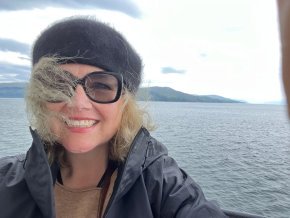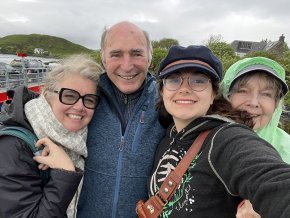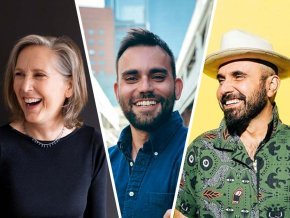
Exploring the world of narrative healthcare
The stories we tell ourselves and others define our identities and our relationships – from our answer to “How was your day?” to recounting childhood memories. Narrative healthcare – also known as narrative medicine – harnesses the potential of storytelling for healing our bodies, minds and communities.

Laura Hope-Gill, MFA, associate professor of creative writing, explores the potential of the narrative approach through her teaching and her non-profit, Story Sangha. She uses the term narrative healthcare to describe the program at Lenoir-Rhyne and her work in the field because it suggests a fully interdisciplinary approach to healing and storytelling. Students enroll in her classes from multiple professions and include physicians, nurses, counselors, educators and writers.
“We have decades of research and data supporting the effectiveness of narrative healthcare as spiritually and medically sound,” Hope-Gill explained. “In the new paradigm of clinical medical practice, emotions hold value. To be clear, if we don’t attend to our emotions, we get sick. We know now that emotional trauma can turn into physical illness. We know that depression has physical symptoms. The line between body and psyche and soul and mind is no longer definitive.”
Discovery
Hope-Gill began studying Indigenous healing practices – including storytelling – while living in a cabin near the Strait of Juan de Fuca and teaching basic education to Indigenous students in Port Angeles, Washington.

“I was reading books like ‘Shamanic Odyssey: the Lushootseed Salish Voyage to the Land of the Dead’ and ‘Shamanism: The Archaic Techniques of Ecstasy.’ Even though they started out as a support for being a good teacher to students of cultures other than my own, these were not academic readings for me. Living alone surrounded by wilderness with zero distraction will open you,” she shared.
Storytelling – including poetry, song and narrative – has a long tradition in medical as well as social and spiritual practices in Indigenous cultures worldwide. Indeed, those cultures make few distinctions between a person’s physical, social and spiritual being. The healing properties of narrative have become mainstream in Western healthcare via practices such as talk therapy and journaling in mental health treatment. Since the mid-1980s, studies have shown that writing about trauma also correlates with improvements in physical health.
“We heal when we tell stories, share what’s in our minds and spirits. The more we tell, the less shame, trauma, guilt, grief, and anger we no longer have bottled up inside us,” said Hope-Gill. “This is the common thread through the world’s spiritual practices: get what’s inside outside. This is done by song, dance, story, poetry, all practices of maintaining personal and community well-being. Narrative medicine is Indigenous medicine with evidence-based data.”
Practice
With narrative healthcare gaining traction in academia and clinical practice, Hope-Gill, who serves as the director of the Thomas Wolfe Center for Narrative at the Lenoir-Rhyne Center for Graduate Studies of Asheville, set a new goal to bring the healing potential of storytelling not only to individuals but to communities healing from deep traumas.
“Healing trauma isn’t done alone because, at first, we’re isolated by our trauma,” Hope-Gill explained. “The outcomes for healing trauma are as social as they are physical. We heal toward community.”
In summer 2023, Hope-Gill established the Story Shepherds project, designed to provide education and support for anyone interested in building storytelling communities for easing conflicts and promoting healing.

To this end, Hope-Gill also traveled to Derry, Northern Ireland in 2023 to begin filming a documentary in which survivors of the Troubles – the decades-long conflict between mostly Protestant loyalists to British rule and mostly Catholic Irish nationalists who wanted a united Ireland. Although the Troubles officially ended in 1998, the trauma of violence remained. Under the umbrella of her Story Shepherds project, Hope-Gill interviewed participants from both sides of the conflict, granting them space to share their stories and experiences, reflect on their healing and how sharing their stories allowed them to forge relationships bridging the barriers of war.
“Every interview related directly to narrative medicine even more than I anticipated, drawing on the Indigenous practice of storytelling – past and present together,” Hope-Gill observed upon her return, as she planned a series of workshops to share the experience further.
In the year since, Story Shepherds has become Story Sangha – using a Sanskrit word for community – and has done work in the Asheville area in cooperation with the Veterans Administration and a range of non-profits. In the winter 2024 issue of The North Carolina Literary Review, she published an essay documenting her journey with narrative medicine that won the publication’s 2023 Alex Albright Creative Nonfiction Prize.
In May 2024, Hope-Gill traveled to Scotland – accompanied by a few friends, family members and students – where she met with human ecology writer, scholar and activist Alastair McIntosh who introduced her to the GalGael Trust. She also visited Scottish Centre for Geopoetics. Both of these organizations utilize storytelling as a component of cultural identity, community cohesion and individual empowerment, and Hope-Gill is working to engage her students and community with these concepts through her Geopoetics Appalachia project.
“The global cultural-renewal movements share a ground of community-rebuilding and healing,” she said. “Storytelling is the ancient technology for healing ourselves and healing the world.”

The Visiting Writers Series will host New York Times Bestselling authors Mary Roach and Andrew Aydin. The Little Read will welcome six-time Emmy-nominated musician, children’s television personality and author Lucky Diaz.
View More
In this update, Rev. Dr. Chad Rimmer, rector and dean of Lutheran Theological Southern Seminary (LTSS), shares exciting developments as LTSS settles into its new home on the campus of Lenoir-Rhyne University.
View More